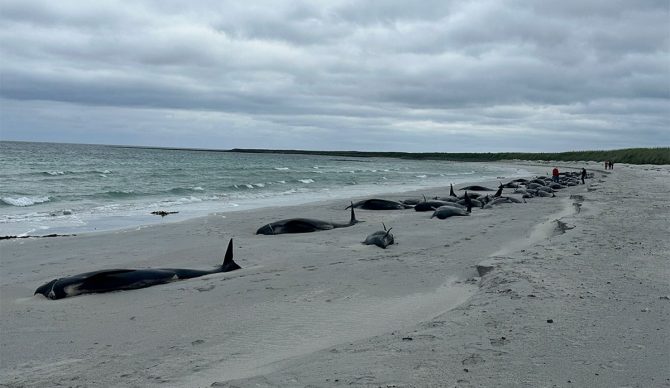
The pilot whales were found on Sunday, July 11th. Sadly, all 77 have died. Photo: British Divers Marine Life Rescue
Seventy-seven pilot whales are dead after they beached themselves in Orkney, an archipelago off the northeastern coast of Scotland.
According to the BBC, it’s likely to be the largest mass stranding in Scotland in decades. Twelve of the whales, which were found at Tresness Beach on the island of Sanday, were alive when they made their way onto the sand. Sadly, after several attempts at getting them back in the water, it became apparent that they needed to be euthanized.
The pod was made up of males, females, juveniles, and several calves. As of this writing, it’s too early to know why the pilot whales stranded themselves, and the public has been asked to avoid the area while experts look for the cause of death.
Mass stranding events are not all that uncommon, but ones of this number are. In 2023, 55 pilot whales died after they beached themselves on the nearby Isle of Lewis. Of those, 15 were alive when they were found, and only one was able to be saved via re-floating efforts.
When whales strand themselves, they generally need to be pushed back onto their bellies and back out to sea as soon as possible if there’s a chance of survival. In the Orkney stranding case, however, the area was cut off by a high tide, and the sand the whales were on was far too soft for them to be rolled over.
Emma Neave-Webb, who works with the British Divers Marine Life Rescue (BDMLR), said that it was clear that the whales had already been beached for some time when they were found. She said that it was “really quite horrible” and “hugely emotional.”
Rescuers spent hours pouring water on the pod of whales in an attempt to keep them alive long enough to be pushed back into the ocean, but it became clear that euthanizing the surviving whales was the humane option.
“In previous circumstances where whales have beached on our shores and subsequently died, the approach from our Environmental Health team around disposing of the body has been to allow nature to take its course – with the public advised to stay away from the area,” a spokesperson for Orkney Islands Council told reporters. “Our assessment in this case, given the scale and the likely public health implications, is that more definite action will need to be taken, for example burying them where they are or removing the bodies to a large grave site elsewhere.”
Strangely, large scale mass strandings have been on the rise around Scotland in recent years, although the reasons are unknown.
“It used to be quite unusual to have a mass stranding event, certainly of this size,” Andrew Brownlow of the Scottish Marine Animal Stranding Scheme told the BBC. “But over the last 10 years or so we have seen an increase both in the number of mass stranding events around Scotland and also the size of the mass and the number of animals that it involves. So that is slightly concerning and that might be because there are just more animals out there, or it could be that there are more hazards that these animals are exposed to.”

